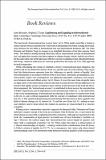| dc.description.abstract |
The hard work of international law is never done (at 8). What might sound like a truism to some is still not well accounted for by a vast body of scholarship even when crossing the boundaries between the two fields of International Law and International Relations (IR). Yet, Jutta Brunnée and Stephen Toope do engage in an insightful discussion of just that ongoing hard work. The authors carefully develop what they call an interactional account of international law and apply this concept to the three regimes on climate change, torture, and the use of force. By the same token, the work takes issue with the concept of compliance that, following Brunnée and Toope, cannot be reduced to an outcome produced by the norm (at 121). This approach by itself is impressive. While articulating the (cl)aim to establish a theory of international legal obligation, the authors ask for the distinctive feature of law as a specific type of social ordering. They argue that this distinctiveness emanates from the adherence to specific criteria of legality that they substantiate in accordance with the work of Lon Fuller: generality, promulgation, non-retroactivity, clarity, non-contradiction, not asking the impossible, constancy, and congruence between rules and official action (at 6). Hence, it is not the mere form of specific rules (as legal rules) or the enforcement of those rules that accounts for the relevant difference; it is practice that applies norms according to these criteria. In the first part of the book the theoretical argument, the interactional account, is established in three moves: the reproduction of Fuller's legal theory and its deployment in the international realm (ch. 1), the elaboration of the social underpinnings of international law through a discussion of constructivist work in IR (ch. 2), and a critical engagement with the concept of compliance with. |

